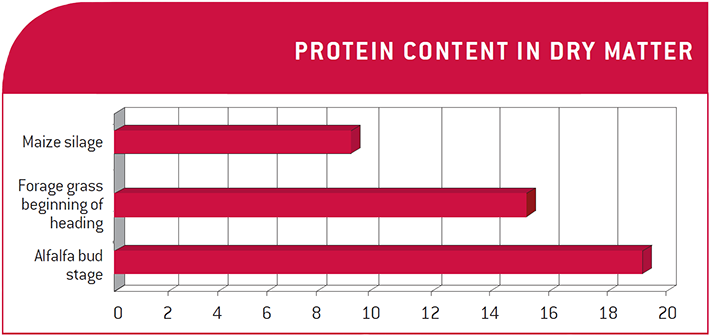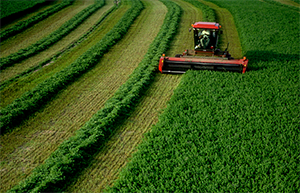Easy-to-grow alfalfa is good for farm profitability
Farms that rely on protein-rich feed can become much more self-sufficient by growing alfalfa. Sowing a field of alfalfa helps cut the input costs, protects against fluctuations in protein prices, raises farm yields, and improves farm finances.
23/02/2017
Alfalfa is a surprisingly easy crop to grow – and highly productive, too. You can generate over 3.000 kg protein from every hectare you sow. Alfalfa is such a rich source because it contains between 18% and 20% protein. It is a far better source than forage grass (14%), maize (9%) or soya (1.200 kg protein/ha).

Weight by weight, alfalfa gives more protein.
Alfalfa raises yields in later crops
 The benefits of alfalfa are lasting. When you switch to another crop, the nitrogen that the alfalfa fixed in the soil increases the yield of that later crop.
The benefits of alfalfa are lasting. When you switch to another crop, the nitrogen that the alfalfa fixed in the soil increases the yield of that later crop.
The nitrogen gets into the soil through a symbiotic relationship between alfalfa and the nitrogen-fixing bacteria, Rhizobium. Although alfalfa grows well in most healthy and well-drained soils with a pH above 6, the optimum soil pH for nitrogen fixing is 6.5. Combine that with a well-managed crop rotation and yields are increased in subsequent crops by as much as 5% without adding any extra nitrogen.
Alfalfa is good all round
- Extremely drought-tolerant
Deep roots make alfalfa extremely drought-tolerant compared to other forage crops. During a dry period in temperate regions, alfalfa will continue to grow and to provide a secure feed supply.
- No nitrogen fertiliser needed
A field of alfalfa is entirely self-sufficient in nitrogen. You do not have to add any because the alfalfa fixes more nitrogen than it needs.
- Fast establishment
The need for weed control in a field of optimally spaced alfalfa is minimal. The plant establishes faster than the weeds, which means less use of chemicals and a more environmental friendly farm.
- High nutrient value
Beef cattle do well on alfalfa. The high content of essential fibres, tannins, essential amino acids, microelements and vitamins produce more tender meat.
- A good storage feed
Alfalfa is good for silage, for wrapping, and for producing high-quality hay from only a few cuts each season. When cut, alfalfa dries fast, and offers a high dry-matter and protein content.
Learn more about alfalfa
To learn more, contact your local DLF representative or product manager. They will be delighted to help.
Or click here to learn more about alfalfa and all its benefits.
Read about our alfalfa varieties and breeding programme.
Find af ForageMax® mixture containing alfalfa.
(Use the filter by ticking off 'Alfalfa' on the left side of the page).
